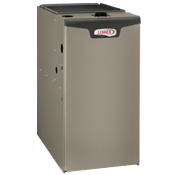How Long Does a Furnace Last? A New Jersey Tech Explains
November 11, 2024

The general answer: Gas furnaces can last up to 15 years while electric furnaces can last up to 20 (if kept properly maintained). Electric furnaces typically last longer than gas furnaces because they don’t use combustion gas or vent exhaust which prevents them from aging as quickly.
While this is the general lifespan of a furnace, the exact lifespan depends on:
- The AFUE rating of your furnace
- Whether your furnace is properly sized
- How well your furnace has been maintained
We’ll explain below.
Lifespan factor #1: AFUE rating
AFUE stands for annual fuel utilization efficiency, and is how furnace efficiency is measured. For example, if a furnace has an AFUE of 95%, 95% of the energy in the fuel is turned into heat and 5% dissipates.
A furnace with a higher AFUE rating usually comes with the following perks:
- An increased furnace lifespan (Because of the features that make a high-efficiency furnace run efficiently)
- Lower monthly utility costs
- Increased comfort (consistent temperatures)
- Decreased noise
- Less environmental impact
While AFUE rating decreases over time, if kept properly maintained, a high-efficiency furnace will usually have a longer lifespan.
Lifespan factor #2: Proper size
Having an oversized or undersized furnace can shorten your furnace's lifespan.
Not sure whether your furnace is over/undersized? Check for these tell-tale signs…
If your furnace is “short cycling,” it’s probably oversized.
When furnaces are too large for the space they’re heating, they heat quickly and shut off. This causes a multitude of issues, including:
- Shortened lifespan - An oversized furnace that is regularly shutting on and off is going to experience faster wear and tear, shortening its lifespan.
- Increased energy bills - Your furnace uses more energy when it short cycles than it would if it was running consistently, which can lead to increased energy bills.
- Hot a cold spots - If your furnace is heating the space quickly and then shutting off, it doesn’t give the warm air time to circulate, causing very warm areas and areas of your home that are cooler.
If your furnace is running constantly to keep up, it might be undersized. If your furnace is too small for the space it’s trying to heat, it will run more than it should trying to maintain a warm home, causing:
- Shortened lifespan
- Increased energy bills
- Cold areas of your home
If your furnace is too large or too small for your home, the lifespan could be significantly less than it could be if it was sized properly.
Lifespan factor #3: Maintenance
Maintenance is key to extending the life of your furnace. The rule of thumb is to have your furnace serviced at least once a year. Ideally, this should be done shortly before heating season so that any issues are resolved before your furnace starts working hard for the winter.
Investing in the health of your furnace not only extends its life but also:
- Helps avoid expensive repairs
- Can reduce high heating bills
- Maintains the manufacturer’s warranty
- Ensures the system is running without risk to your health or safety
Maintenance plans are a great investment and are usually very cost-effective considering what they provide.
A quality maintenance plan should include:
- Lifetime warranty on parts installed
- Priority customer service
- 24-hour emergency service
Ready for a new furnace?
If your furnace is reaching its age limit or you’re facing costly repairs, reach out to our team for accurate estimates on furnace installations and maintenance plans.
